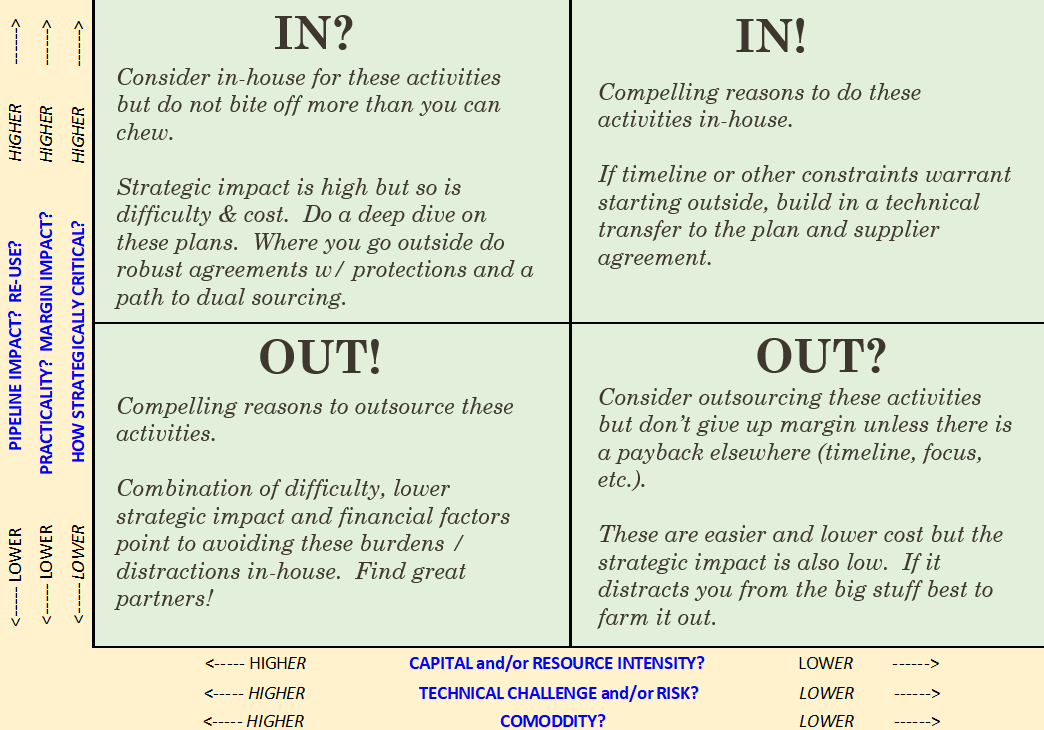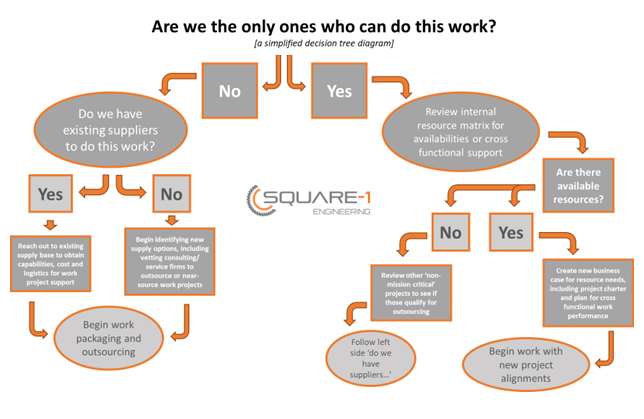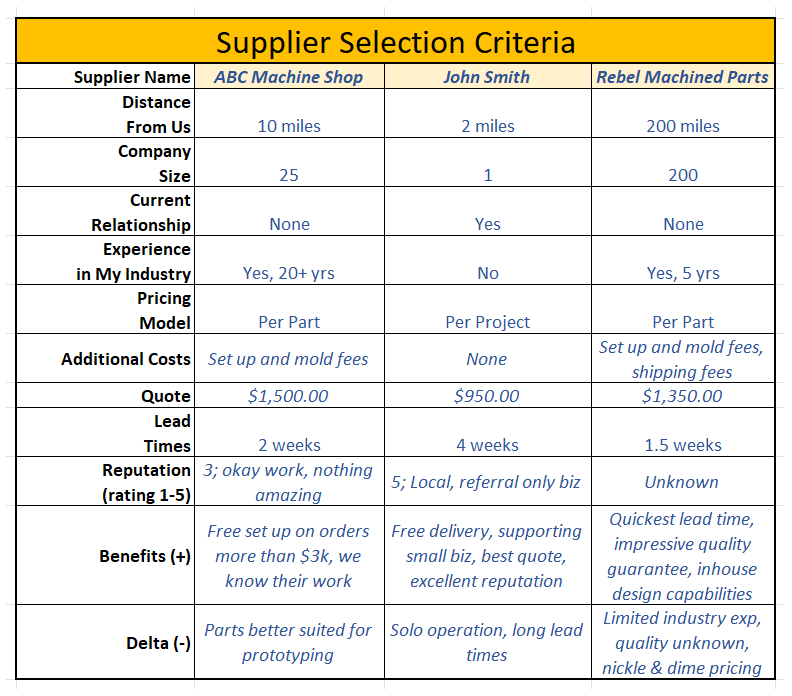|
Today's Medtech Snapshot episode features Seth A. Kaufman, MSHCA as he shares his insights on the best way to land a great clinical research organization (CRO) partner - before you need their help! Hear how Seth outlines his engagement process, things to watch out for and ways to approach your trials with your new partnership. Interested in listening to our past episodes of Medtech Snapshot? Check out our growing library archives at https://www.sqr1services.com/white-papers/category/snapshot #CRO #clinicalresearch #clinical #medicaldevice #medtech #outsourcing #trials #snapshot #partnership The quickest way to overcome a business challenge is to get help from those who are experienced in besting your beast! The team at Square-1 Engineering is comprised of a variety of technical and project management professionals who are subject matter experts in the areas of NPD, Quality, Compliance and Manufacturing Engineering. Learn more about how we can solve your work and project problems today to get you back on track!
0 Comments
In this Medtech Snapshot episode we cover strategies for supplier management and maximizing operational efficiencies when it comes to getting work done. Listen in as Todd Abraham, medical device chief operating officer, explores creative outsourcing, commodity-based decision making and practical manufacturing operation considerations. Need help making a decision on which tasks to keep internally versus to consider outsourcing? Todd has developed the above decision matrix to help guide the process of identifying when it is appropriate to outsource versus insource a particular task. The more we use tools like this to help in our decision making process the better chance we will have of making the right decision, first time around. #suppliermanagement #operations #medicaldevice #medtech #outsourcing #commodity #manufacturing #operations #snapshot The quickest way to overcome a business challenge is to get help from those who are experienced in besting your beast! The team at Square-1 Engineering is comprised of a variety of technical and project management professionals who are subject matter experts in the areas of NPD, Quality, Compliance and Manufacturing Engineering. Learn more about how we can solve your work and project problems today to get you back on track!
Sanjay Shrivastava, Ph.D. joins us on Medtech Snapshot to talk about medical device contract manufacturing partners - when to strategically engage them, especially if you are a startup, and the importance of "keeping the end in mind" throughout the process. Interested in catching up on our past Medtech Snapshot discussions? Visit #medicaldevice #medtech #snapshot #contractmanufacturing #contractmanufacturer #outsourcing #startup The quickest way to overcome a business challenge is to get help from those who are experienced in besting your beast! The team at Square-1 Engineering is comprised of a variety of technical and project management professionals who are subject matter experts in the areas of NPD, Quality, Compliance and Manufacturing Engineering. Learn more about how we can solve your work and project problems today to get you back on track!
Selecting the right medical device contract manufacturing partner is a critical decision that can significantly impact the success of your medical device development and production process. There are many advantages which come with working with a contract manufacturing partner, chief among them is it can potentially help you get out to the market quicker without having to go vertical, building up your own production system internally. The right partner can also offer cost savings as a result of their established supply chain partners, ability to scale and expertise in developing similar products. While those advantages can indeed be a blessing to a maturing business, landing the wrong partner can also be a curse. For this reason its vital device companies utilize a strategically planned process for how they are to approach and select a new contract manufacturing partner. The more due diligence one can do on the forefront the better the likelihood will be you will see success on the back end. Here are some important criteria to consider when evaluating potential contract manufacturing partners: 1. Experience and Expertise: Look for a partner with experience in manufacturing similar medical devices. Their expertise in the specific type of device, materials, processes, and technologies is vital to ensuring a smooth production process and high-quality output. 2. Capabilities and Facilities: Evaluate the contract manufacturer's facilities, equipment, and technological capabilities. Make sure they have the necessary infrastructure and resources to meet your manufacturing needs and scale as your project progresses. (HINT - learn about their employees. If they have high turnover with their internal staff this could create problems for you in the future) 3. Supply Chain Management: A robust supply chain is crucial for consistent component availability and cost-effectiveness. Assess the manufacturer's ability to manage the supply chain efficiently, including sourcing components, managing inventory, and handling potential disruptions. 4. Flexibility and Scalability: Consider the partner's ability to adapt to changes in project scope or production volume. A flexible partner can accommodate adjustments in design, production, and scheduling, which is important in the dynamic field of medical device development. MEDTECH SNAPSHOT: CONTRACT MANUFACTURING In this episode we are joined by Innova Vascular's CEO Sanjay Shiravastava who takes us through several pointers on when to consider finding a medical device contract manufacturing partner to aide in your go to market strategy. Here from Sanjay on why it's "important to begin with the end in mind". 5. Regulatory Compliance: Ensure that the contract manufacturer has a solid understanding of regulatory requirements, such as FDA (or equivalent) regulations, ISO standards (e.g., ISO 13485 for medical devices), and any other relevant local or international regulations. They should have a track record of successfully producing devices that meet these requirements. 6. Quality Management: A strong quality management system is crucial for medical device manufacturing. The partner should have established quality control processes, including inspection, testing, documentation, and corrective action procedures. They should also have a history of adhering to quality standards and maintaining good manufacturing practices. Their data and practices should be transparent and they should be open to you reviewing this information. 7. Geographical Location: The location of the contract manufacturer can impact shipping costs, lead times, and the ease of visiting the facility for inspections or meetings. 8. Intellectual Property Protection: Ensure that the contract manufacturer has protocols in place to protect your proprietary information and intellectual property throughout the manufacturing process. Do they work with a competitor of yours, if so how will they ensure your IP and product is protected? 9. References and Reputation: Research the manufacturer's reputation in the industry. Seek references from other companies they have worked with and review their track record to gauge their reliability, performance, and commitment to quality. 10. Cost and Pricing: While cost should not be the sole deciding factor, it's important to have a clear understanding of the pricing structure, including setup costs, unit costs, and any additional charges. Pricing should be clearly laid out and defined in your contract; stay away from partnerships where things seem murky and or inconsistent from a pricing perspective. 11. Long-Term Partnership Potential: Consider whether the contract manufacturer is interested in building a long-term partnership and is willing to support your future projects and iterations. 12. Employees and Training: Be mindful of how their employees are treated, trained and managed. High turnover at a contract manufacturer may mean you find yourself constantly involved int he training process to ensure the operators and assemblers working on your product are working as expected. The more turnover that occurs the more training that will need to take place, which means your partners training methods and consistently is critical to your success. High turnover and poor training will inevitably lead to yield problems. Before making a final decision, it's advisable to visit the contract manufacturer's facility, meet their team, and discuss your project in detail to ensure alignment and understanding. Taking the time to thoroughly assess potential partners will increase the likelihood of a successful and fruitful collaboration in medical device manufacturing. When you’re early in the development process it can seem like there’s a never ending list of activities and projects your R&D team needs to take on. When you’re in this mode its vital R&D leaders assess time, resources and associated risks with the product they’re developing. Medical device product development executive Arif Iftekhar walks us through how to focus your team and address the most important product risks head on at an early stage. In this episode of Medtech Snapshot we discuss strategic supply chain strategies with medical device supply chain and manufacturing executive Jeff Brown. Key points in this discussion include addressing situations similar to China and Taiwan, solutions to hedge yourself against such global challenges, including but not limited to supplier risk, back-up capacity and vertical integration. Need help sorting through your supply chain and or contract manufacturing challenges? Learn more about Square-1 Engineering's capabilities as it relates to all things manufacturing engineering: NPI, tech transfer, pilot manufacturing, process development and improvement, supply chain management, etc. Click HERE to learn more.
Our managing director Travis Smith covers five (5) key questions anyone in a buying position should be asking a consulting firm or individual consultant to better qualify them prior to making the buying decision.
Read the full article at www.sqr1services.com/white-papers/how-to-solve-your-1-business-challenge We’ve all experienced it – too much work, not enough time or resources to complete it. Day after day passes, the work doesn’t slow down but your timeframes become shorter and shorter furthering the stress of the looming workload. All companies, start up to conglomerate, experience this same situation. They’ve got work they can’t get to given the circumstances of their business. Usually it’s…
We can all agree we’ve seen this first hand and very well may be living it now within our current companies. The key question then becomes, “How do we address the ‘too much work, not enough [blank]’ commonality we all share?” First, we need to assess the work in question and is it mandatory to keep close to the chest? Meaning, are we the only ones who can do the work? If your answer is: NO – “the work can be done by someone else”; we should begin looking for alternative means for getting the work done via our supply base or strategic partners. First, review your existing base of suppliers and their capabilities to see where work can be sent out. Second, identify firms which provide outsource services. Many times the word ‘outsourcing’ is used as an all encompassing description for service providers that offer project or work package support, often which can be done onsite with the client just as easily as offsite – which would be the traditional method of outsourcing. YES – “the work can only be done by our organization”; we should review the matrix of resources versus project loads. Undoubtedly there are resources within the organization that aren’t working at full capacity and or are assigned to projects which aren’t immediate. The trick with this approach is it may not satisfy the situation long term, often times when we try to keep things in house all we do is push off the situation to a later date. If that doesn’t work, test your bias on ‘the work can only be done by us’. If you are in fact going to consider using an outsourcing or consulting firm to support you in your work projects be sure to follow this simple three step process to ensure you’re picking the right partners:
Key Take Away: Sometimes the best business decision we can make is deciding what work we want to do [internally] to increase our capacity and efficiencies while outsourcing work to suppliers or service providers which specialize in project work. In turn, this means we can focus on the mission critical work, that we enjoy and are great at doing while giving someone else the work and or projects we can’t handle or don’t want to deal with. Action Item: Utilize the below decision tree diagram (yes, it’s overly simplified) to help you determine if the work you have in question should stay internally versus would benefit from being handled by an outside source. Are you looking for an outside services firm to help you with your projects? If so, our company Square-1 Engineering, would be happy to speak with you about your needs. Check us out and let us know how we can help by clicking HERE. We’ve had an unprecedented amount of commentary and feedback on the original article published in early 2018 covering ‘Picking the Right Supplier’. Given the current economic and supply chain challenges facing many businesses in 2022 we’ve updated the article to reflect today’s business needs in an ever-changing marketplace. When you need help in your business how do you figure out where to go to find it? Just as important, how do you make sure the help you select is the right one for the job? The supplier selection process (finding and picking your help) is an important and vital step for any size company. Making the wrong decision can lead to countless hours of wasted time and of course money down the drain. To find the right supplier, a ‘supplier selection process’ is important to develop ahead of time, especially for small and start-up based business where decisions can have a larger impact on the state of the business. When looking for a new supplier follow these steps to best position yourself and company for success in picking the right relationship for your business: 1. Know What You Need Before You Need It Two reasons this is important: 1st – if you don’t know what you need how will you be able to explain it to a supplier? If you can’t explain it how will they understand what you need to then be able to successfully deliver on your behalf? When we know what we need, and therefore want, we're better prepared to explain those needs while setting expectations for what a successful partnership looks like. This minimizes miscommunication and opportunity for expectations to fall through. 2nd - Waiting till the last minute to find suppliers often leads to decisions being made which may get you out of a momentary jam but leads to larger problems down the road. For this reason it’s vital you are proactive in establishing relationships with vendors and suppliers before you actually need their help. 2. Finding A Supplier Referrals, referrals, referrals! Once you know what you need the best approach to finding the right supplier is by reaching out to others in your industry, or local industry associations, to learn who they use, and just as important who they don’t use. Take the time to read reviews, gather intel from people you trust before you start calling potential suppliers. While sites like Thomasnet and Google can provide this information it is likely you will quickly find yourself overwhelmed with information. In the end the most useful data is those that are unbiased or comes from experience which is best collected from trusted resources. Me personally, I would rather work with someone I know, or with someone a close source to me knows, rather than cross my fingers and hope for the best by using an online search. As stated in #1, do the leg work to find suppliers proactively before you actually need it! 3. Be A Detective, Collect Useful Information It's vital you vet all potential suppliers with the same list of needs, criteria, and expectations this way you can compare each supplier and what they bring to the table. This will help to create an even playing field when looking at a supplier’s capabilities, offering and of course pricing. Below shows an example of what a ‘Supplier Selection Criteria' may look like. Using this type of tool allows you to collect similar information while comparing against other options. It’s important to remove emotion from this process while sticking to facts. Remember – each situation may be different. There may be a time you need something quickly, in this situation ‘quick response’ usually translates to higher cost. Maybe location of your supplier or their experience in your industry is important. Each situation is different and should be viewed as so in order for you to determine what supplier is best fit for your needs. 4. Strategic Thinking & Economies of Scale Once you know what you need from a supplier it’s important to think about other associated or cross functional activities which need to be done that could be accomplished by a single supplier. The ideal situation is you find a supplier that can do more than just one component of your needs, therefore providing more value in the long run. This also saves time because you have less suppliers and vendors to managed increasing your efficiency and effectiveness. Lastly, its not uncommon when you have one supplier doing several things for you to experience a price break as a result. The flip side may also be true – if you have one supplier dominating a particular part of your business that can also be a risk point as well. Balance is key here while consistently reviewing your relationships, needs and financial output annually. 5. Proactively Learn About Your Suppliers Behaviors When speaking with a potential new supplier try connecting with the people you will be working with, not just the company’s salesperson. This is important because once the relationship is established most of your time won’t typically be spent with their salespeople rather those delivering the service or product. When courting a supplier pay attention to things like:
6. Economics & Supply Chain Simply put - can your supplier withstand a downturn in the economy? Do they have a strategy in place for dealing with supply chain issues? I love working with small companies because I think it’s important to support small businesses, however I do often think about their ability to weather the storm from a business continuity perspective. Regardless of the size of the supplier, what is more important is can they continue to meet your needs even when times get tough. If they are a critical supplier to your business it’s worth spending time to learn about this proactively as you don’t want to find yourself in a situation where the economy takes a digger causing your supplier to go belly up or unable to meet its commitments. Your supplier’s inability to manage their business may just leaving you high and dry, in the process causing you to have your own business continuity issues. In the end, the supplier selection process should ideally come down to three things, in ranked order: 1. Performance 2. Relationship 3. Price At the end of the day it doesn’t matter how affordable or cost effective a supplier is, or how nice they are as people. If they can’t perform, and do so consistently, the other two ultimately don’t matter. I’ve also found that paying a bit more for the right service and relationship often is worth the investment it in the long run despite the extra cost up front. As Benjamin Franklin is quote as saying, “The bitterness of poor quality remains long after the sweetness of low price is forgotten.” [Click Play] Gallup indicates 70% of startups fail in the 1st 5 years. What are
your thoughts on these six strategies to improve the chances of commercializing your startup or getting acquired? #medicaldevice #startup #lifesciences #outsourcing #reimbursement #valueproposition #marketaccess #strategiesforsuccess #strategy #commercialization #acquisition About the AuthorTravis Smith is the founder and managing director of Square-1 Engineering, a medical device consulting firm, providing end to end engineering and compliance services. He successfully served the life sciences marketplace in SoCal for over 15 years and has been recognized as a ‘40 Under 40’ honoree by the Greater Irvine Chamber of Commerce as a top leader in Orange County, CA. Categories
All
Archives
July 2024
|
Visit Square-1's
|
|










 RSS Feed
RSS Feed


